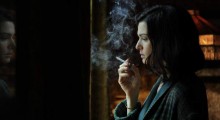Terence Davies
-
“The Language is Being Destroyed”: Terence Davies on A Quiet Passion

A Quiet Passion is a film of many firsts for Terence Davies: his first biopic, his first all-digital-feature, and — unexpectedly — his first work which, for a time, could pass for a comedy. Davies introduces Emily Dickinson as a young girl, spends the metaphorical first reel establishing her complicated personality — devout but doubting, jealously proud of her poetry yet scared to be recognized for it. In a startling sequence, he dollies in on Emily and her family members as they have their photos taken: during the track in, a very subtle dissolve ages them all into adults. The grown […]
by Vadim Rizov on Apr 13, 2017 -
Studio 54: The New York Film Festival, Part I

On the evidence of the finest films in the first third of this 54th edition of the New York Film Festival, those familiar with the exhibitionistic, amped-up social set that frolicked in, gawked at, or read about the notorious, dear-departed Manhattan night spot might find it ironic, or a misnomer, that its moniker is my appropriated title for this initial NYFF feature. Sure, Lincoln Center ranks far lower on the cool scale than the legendary club, but, a testament to tenacity, merit, and resilience — how it has managed to survive continuous power struggles and administrative shuffles of parent organization […]
by Howard Feinstein on Sep 29, 2016 -
Symphonies and Singin’ In the Rain: Terence Davies on Sunset Song

A long-in-the-works passion project, Terence Davies’ adaptation of Lewis Grassic Gibbon’s novel Sunset Song follows Chris (Agyness Deyn), a Scottish farmer’s daughter whose marriage to Ewen Tavendale (Kevin Guthrie) collides straight into the early days of World War I. There are familiar Davies visual and thematic motifs throughout — the film’s first part tracks Chris’ hellish family life under the tyrannical reign of another bad father (Peter Mullan), a wedding sequence has group sing-alongs, and a sweeping crane shot of a muddy WWI battlefield is a textbook example of his penchant for camera movement as primary narrative propellant. In the days before […]
by Vadim Rizov on May 12, 2016 -
BETWEEN THE DEVIL AND “THE DEEP BLUE SEA”
Hester Collyer (Rachel Weisz) appears to have everything. The 40-ish protagonist of Terence Davies’s new film, The Deep Blue Sea, set in London in 1949-50 and adapted by Davies from Terence Rattigan’s 1952 play, she is stunning, wealthy, cultured, intelligently opinionated, and articulate. But her inability to make the distinction between love and lust proves to be her downfall. Most of us learn to know the difference. Although it might be difficult for someone in 2012 to fathom, Hester is a creature of her times. This daughter of an Anglican vicar married according to class expectations. Her husband was a […]
by Howard Feinstein on Mar 22, 2012 -
Terence Davies, The Deep Blue Sea

One of the United Kingdom’s most lauded stylists, Terence Davies has carefully crafted a body of work that fits squarely into the class-conscious, post-neorealist tradition of British cinema, working without much fanfare or regard for the exigencies of commercial filmmaking that the age and his stature would seem to demand. Now in his mid-sixties, Davies has in the last 30 years quietly established himself as one of the finest British filmmakers of his generation. He is not a cinephile and his lugubrious, sublimely photographed and insidiously hard-hearted narratives — such as 1988’s Distant Voices, Still Lives, which will screen as […]
by Brandon Harris on Mar 21, 2012 -
Of Time and the City: Terence Davies On His Lyrical, Melancholic Memory Piece, Of Time and the City
For Terence Davies, his youth — his early years in Liverpool, his relationship with his mother, and his feelings about being gay in that working-class town — have always provided the raw material for his filmmaking. His celebrated “Terence Davies Trilogy,” a collection of shorts, and later features like Distant Voices, Still Lives and The Long Day Closes summon up for the viewer an interior life with a rare combination of lyricism and heartache. These films cemented Davies’s international reputation, but after two more, non-autobiographical features (The House of Mirth and The Neon Bible), he became less active, a development […]
by Scott Macaulay on Jan 20, 2009
